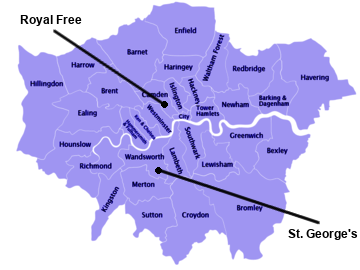Participate - St George's University of London Hospital
This site is not currently recruiting
The St George's University of London Hospital site is recruiting participants from the London area :

Comparing COVID-19 vaccine schedule combinations in adolescents
Thank you for your interest in the Com-COV3 study. This study has two parts (or cohorts). The first part of the study (Cohort A) has completed recruitment. The second part, Cohort B, is currently recruiting participants.
Com-COV3 Cohort B
The purpose of this part of the study is to find out how well young people (aged 12-15½ years) respond to a third dose of COVID-19 vaccine. We will compare the side effects and immune response to different options for the third dose, including two “low dose” options.
Condition Studied
COVID-19
Study Length
6 or 7 months
Number of visits
4 or 5
|
|
Study Visit |
||||
|
Visit1 Day 0 |
Visit 2 Day28 |
Visit 3 Day84 |
Visit 4 Day182 |
Visit 5 Day210 (Group 5 only) |
|
|
Groups 1-4 |
|
|
|
|
|
|
Group 5 |
|
|
|
|
|
Blood test
Vaccine
Am I eligible to participate?
To take part, you must have already received two doses of Pfizer COVID-19 vaccine
Participants should:
1. Be aged between 12 years and 15½ years (on the date of enrolment into the study)
2. Have no significant medical history
3. Be willing to have their medical history discussed with their GP
To be eligible, participants should live near one of the centres running the study:
1. Cambridge
2. Cardiff
3. Leeds
4. London - Royal Free Hospital
5. London - St George’s University Hospital
6. Manchester
7. Newcastle
8. Nottingham
9. Oxford
10. Southampton
11. Sheffield
Participants will need consent from a parent or guardian.
What happens in the study?
In this part of study, we will recruit a total of about 380 participants. All will have already received two standard doses of Pfizer vaccine. We will arrange to see them about 3 months after their second vaccination for the first study visit. At this visit, participants will be randomly allocated to one of five groups to determine which study vaccine they will receive:
1. Adult dose Pfizer vaccine, given at the first study visit
2. Low dose Pfizer vaccine, given as one-third dose adult vaccine at the first study visit
3. Low dose Pfizer vaccine, given as full dose paediatric vaccine at the first study visit
4. Adult dose Novavax vaccine, given at the first study visit
5. Two doses of the Group B meningitis vaccine (given at the first and third study visits); then adult a dose of the Pfizer bivalent vaccine, given at the fourth study visit (around 6 months after the first visit)
Participants will have a blood test at each visit, to measure immunity to COVID-19. Anaesthetic cream can be provided to minimise discomfort from the blood tests.
Some participants may also have samples of nasal fluid and saliva taken, but this is voluntary and will only occur at some sites.
Participants will complete a diary to record symptoms experienced after vaccination.
Lateral flow tests will be required at the first visit and then weekly for four weeks. All participants will also be asked to take a lateral flow test if they have symptoms of COVID-19 (such as fever, cough, sore throat or loss of smell or taste) at any time during the study. Participants in Group 5 will also have a lateral flow test before their fourth visit vaccination and then weekly for four weeks afterwards.
Visits will take place at St George's University of London Hospital.
Is there any reimbursement for the study?
Yes. We are able to reimburse at a rate of £10 for each study visit. This may be paid in vouchers. Reimbursement may not be made at every visit (for example, a £20 voucher may be given at every other visit).
What are the advantages of taking part?
Participants will receive a third dose of COVID-19 vaccine. At present in the UK, healthy young people aged 12 to 15 are routinely offered only two (standard) doses of vaccine. Participants allocated to Group 5 will also receive two doses of the Group B meningitis vaccine. The results from this study will help to inform decisions about how best to vaccinate young people against COVID-19
What are the disadvantages of taking part?
No-one likes blood tests or injections, but we will do our best to ensure they are not too unpleasant.
Vaccines, like all medicines, can have side effects. These are usually minor (such as a sore arm) and usually last only a few days. More serious side effects are rare, and we will discuss these with you in more detail if you might wish to participate.
What will happen if I change my mind about taking part?
Participation is voluntary and you are free to change your mind and withdraw at any time. You do not need to provide a reason. This would not affect your subsequent medical care in any way.
Who is funding this study?
This study is funded by the UK Vaccine Task Force and the National Institute of Health Research, and co-funded by the Coalition for Epidemic Preparedness Innovations (CEPI).
What do I do if I want to take part?
Please complete the screening form below
Who can I contact if I have questions?
E-mail us at : com-cov3@sgul.ac.uk
Participant Information Sheets & Screening Forms
Child : Participant Information Sheet (PDF)
Parent / Guardian : Participant Information Sheet (PDF)
This site is not currently recruiting
Parent / Guardian please complete the Screening Form




